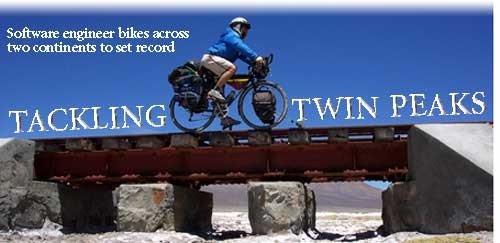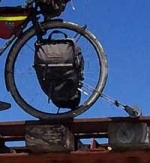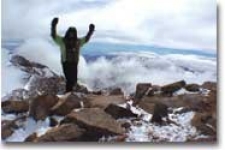by Brendan Cooney
Holed up for days, three-quarters of the way up one of the highest mountains in the world, Eldon Dales repeated the "climber's equation" over and over in his head. Outside his tent, the temperature plummeted to 20 below zero as the deafening 60 mph winds gusted over Mount Aconcagua, South America's highest alp. Inside and down to his final three packs of food, Dales agonized over whether his daily calorie intake, which had fallen from 5,000 to a mere 1,000, would be enough to summit.
"I was doing math constantly," the '85 University of Cincinnati nuclear engineering grad says. "Calories are gold. I had less energy at 1,000, and I was colder at night."
He considered descending for more food to try again, but instead, chose to push on. The rations turned out to be enough to get him through, and when he finally made it to the top on Christmas Eve, 2002, he found himself all alone.
"Here I was absolutely alone for the whole summit day. That's very unusual. There were other people at the top when I climbed Mount Denali."
He cherished his day as the highest person in the Americas. "All that pain and sweat I went through to make it to the summit was worthwhile."
Though Dales' 19-day solo climb into thin air is impressive, perhaps what is most fascinating is the 40-year-old's 8,000-mile journey from Texas to Argentina to reach the base of the mountain. He did it by bicycle.
Six months earlier, the self-described "computer geek" was spending too much time in front of the screen. Sitting in his home office in Houston, the software engineer found himself losing touch with reality in the world of Internet protocol. So he hopped on a bicycle at the beach in Galveston, Texas -- sea level -- and pedaled his way to Argentina.
Dales wanted to start at sea level, because that's what he'd done a couple of years before when he rode his bike from Galveston to Alaska before climbing Mount Denali (20,320 feet), the highest peak in North America. His winter summit of Mount Aconcagua (22,831 feet) made him the first person to bike from sea level to the highest mountains in North and South America, then climb them both.
When he finally made it to the top of Aconcagua, after an unconventional ascent through brutal cold and winds, Dales celebrated by "wrapping the moment around me." It had been quite a journey with plenty of misadventures. Biking through the Americas presents lots of different natural challenges. "In North America, I cursed the rain," Dales says. "In Central America, I cursed the heat. In South America, I cursed the wind." On the bike trip south, the impediments were just as much human as natural. He got robbed twice, and each time he considered turning back. "I thought maybe I was pushing my luck," he recalls. The first time was in La Libertad, El Salvador, where he lost a camera, shoes, clothes and some cash. "I was staying in a ratty hotel on the beach. Someone entered the room and stole some stuff, and I didn't hear him because of the surf. I kind of suspect it was the owner." The second robbery was in Quito, the capital of Ecuador. Dales was walking on a busy street on a Saturday morning, when a 16-year-old boy with a knife said in English, "Give me your wallet." Fortunately, he was carrying only about $30. But two times was enough. Dales decided that his blond hair was making him an easy target. He went to a drugstore in Quito, bought Miss Clairol No. 57 and dyed his hair, beard and eyebrows brown. Sporting his new look, he avoided getting mugged again. Dales' favorite country was Bolivia, the place he found most different from the United States. "People tend to be very shy in Bolivia; they tend to hide. They also have no concept of business." One time a shopkeeper took a pack of biscuits out of his hands and put it back on the shelf because neither of them had small enough bills. "I couldn't believe it was happening," he says. Bolivia's bad roads and limited supplies made things tough on Dales, attempting to bike his way nearly the length of a continent. In one stretch there was only sand for hundreds of miles, with no road on which to ride. So Dales put his ingenuity to work. He went to a welder's shop and rigged up a contraption that allowed him to ride along a train track. "It's a lot better than slogging through sand," he notes.

 Past Issues
Past Issues

